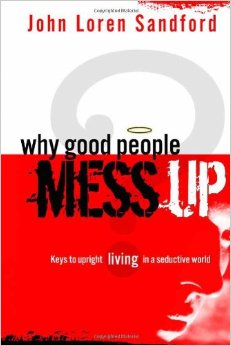Review written by Sherika Chew, Prayer Ministry Intern
Why Good People Mess Up, by John Loren Sandford of Elijah House Ministries, is a treatise on sexual temptation – how and why Christians are drawn into it, and how we can learn to forgive and live differently when it happens. I would highly recommend this book to anyone who desired to be used by God as a prayer minister. After reading it, I felt much more confident that I could adequately minister to someone who was battling sexual sins, or was hindered in his or her walk with Christ because of the inherent condemnation that couples this experience. By helping me to see and receive the grace that God has been trying so persistently to impart to me, this book has given legs to my own testimony, and I am excited and empowered to help others grab hold of transformation and freedom for themselves.
The premise of the book, in short, is that sexual sin happens not because we are “screw-ups” who can’t follow God correctly, but because the enemy seeks to use our hurts and disappointments in relationships to turn away away from God.
Most, if not all the symptoms of sexual sins that were described in this book are deep seated in selfishness and pity, which leads me to believe that if we kept our eyes and minds on the heart of Christ and sought his will above our own comfort, it would be almost impossible to fall into these sins. The lie that leads to falling into this sin is the whole “I deserve” gospel and the desire to put our own happiness above anything else. It is truly a trick of the enemy!
else. It is truly a trick of the enemy!
There is a holy indignation that rises within me to not only no longer allow the enemy to have these points of access in my life, but also to do everything in my power to make sure he doesn’t gain this access in others. I have an all-new perspective on these things and have come to see the dangers of a victim mentality. God is seeking these very same points of access into our hearts, but we will not allow him in if we are stuck in “why me” mode.
Why Good People Mess Up is a book I would keep on my bookshelf so that I could refer to it easily and often when ministering. I don’t believe that it is possible to get a full grasp of all the information in just one reading. Though there was one concept that did really stick out to me that I don’t think I will easily forget. I have often heard of the importance of transparency in ministry. This book shed new light on that for me. I have always felt that if I was honest about my own failings and how God was working in through me, then I was being transparent. I would definitely say that the goal was that people would walk away seeing Jesus, but allowing people to see the “real me” doesn’t necessarily ensure they will see Jesus.
The author described transparency in such a way that made me see that, most times, my honesty was translucent, but not transparent. It made me go to my dictionary. Transparent is defined as allowing light to pass through so that objects behind can be distinctly seen. Translucent is defined allowing light to pass through but diffusing it so that objects on the other side are not clearly visible.
I chewed on this for a while, pondering the number of times my testimony had been so clouded with how I felt, what I wanted, and how I overcame obstacles, that people walked away thinking, “Sherika is such a mighty woman of God!” Those times, they should have walked away saying, “Sherika serves a mighty God!”
I am not, nor do I feel the author was condemning the honesty and vulnerability it requires to allow others to see into our lives. The lesson here is, at the end of the day, we need to be intentional about seeing that the “self” is not blocking others’ view of Jesus. Do we allow light to easily pass through us so that Jesus is clearly seen?
My prayer is: Lord, make me a spotless window into your kingdom, and pass your light in and through me to your people. Be seen in me!
The post Book Review: “Why Good People Mess Up” appeared first on Finding Home Institute.
Source: FHI







